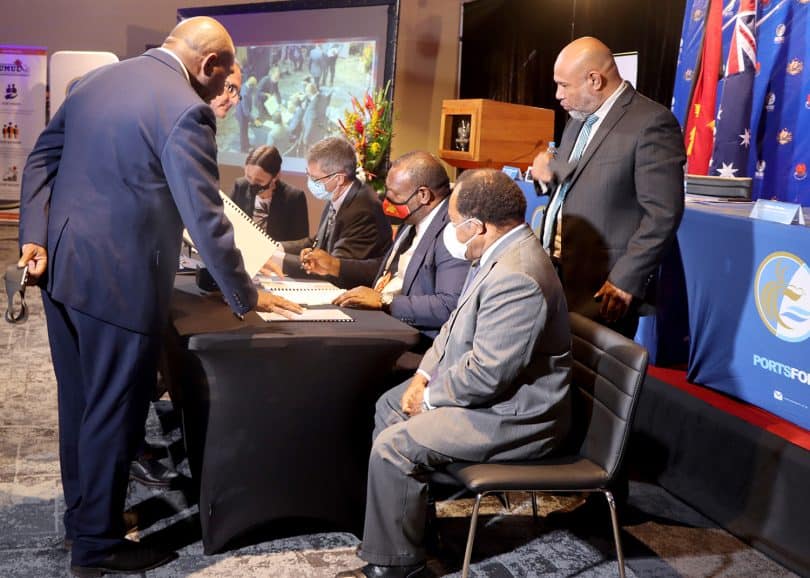The recent two-part ABC Background Briefing series “Dead Man’s Secrets” makes for compelling listening. It is the story of two men, Fego Kiniafa, former PNG Ports CEO, and Don Matheson, Australian businessman and associated of Kiniafa. But it is also a story that raises profound questions not only for PNG Ports but also for its financial backers, the Asian Development Bank (ADB) and the Australian government, through the Australian Infrastructure Financing Facility for the Pacific (AIFFP).
Kiniafa’s death in September 2022 was a tragedy. Its cause would appear to be a drunken, local fight; Background Briefing’s attempts to suggest there might be deeper forces behind the death are not convincing. But, while not related to his death, it is also not in dispute that Kiniafa received a series of unexplained and expensive gifts in the forms of cars, free accommodation in Australia, a racehorse, and dental chairs for his wife (a dentist), all allegedly facilitated by Matheson.
Don Matheson’s company received $4.3 million (US$2.8 million) from the Filipino multinational ports operator ICTSI, as “professional fees” and “consultancy fees”, in the second half of 2017. This was around the time that ICTSI won a tender from PNG Ports to operate its Port Moresby and Lae port facilities for the next 25 years. ICTSI denies any link between the payments and the tender. But Matheson made a number of payments to both Kiniafa and his predecessor as PNG Ports CEO. We know this because Matheson’s banking details were leaked as part of the Panama Papers, and because of the terse bank account descriptions he helpfully used to describe his payments and purchases: “FEGOLANDCRUISER”, and so on.
Since the report was aired, the PNG PM has announced that PNG Ports will be investigated by the new Independent Commission Against Corruption (ICAC). Matheson is surely now being investigated by the Australian Federal Police (AFP) under foreign bribery legislation.
What about the AIFFP and the ADB?
PNG Ports is the biggest beneficiary of the AIFFP to date, being the recipient of a $521 million (US$344 million) loan and a $100 million (US$66 million) grant. After the Background Briefing program, DFAT promptly distanced itself from the scandal by saying that the allegations “do not involve Australian public finance and are historical”. This is true, but disingenuous. Few details of the AIFFP PNG ports project have been made public, but the AIFFP website highlights the upgrading of the Lae port, PNG’s largest, and one of the ports tendered out to ICTSI. Far from the claims being only of historical interest, they raise the risk that Australian-funded assets will be handed over to an operator that received its licence via an allegedly corrupt process.
The AIFFP has informed me that the matter has been referred to DFAT’s Counter Fraud and Anti-Corruption Section. That’s a good start. But it will also be important to know what happens to the Lae port upgrade and who gets to operate the port once the upgrade is complete. One reason for my initial scepticism about the AIFFP was the lack of transparency I thought there would be around the deals Australia would finance, as well as the likely lack of policy conditionality. When I look at the complete lack of detail around the AIFFP PNG ports project, my initial concerns seem justified.
The ADB is also implicated. For the last two years it has been financing state-owned enterprise (SOE) reform to promote SOE “governance and transparency”. The ADB also financed an earlier rehabilitation of the Lae port, and since then has been pushing PNG Ports to contract out the Lae port’s operations. The 2007 ADB loan agreement for the original rehabilitation committed the PNG government, within 24 months of loan effectiveness, to prepare “a time-bound action plan to develop a strategic public-private partnership model to ensure effective and efficient service delivery in the operation of the new port facilities” that its loan was financing. It took the PNG government much longer than 24 months, and the ADB was not involved in the actual transaction, but eventually the envisaged public-private partnership became the contract awarded to ICTSI.
The ADB, like DFAT, says it has a “zero tolerance policy” in relation to corruption, one which covers ongoing and completed projects. The port – the upgrading of which was financed by the ADB – is now being operated, as a result of an outsourcing approach the ADB encouraged, by a company over which a cloud of corruption allegations now hangs.
Corruption is a fact of life in all countries, and it is generally more prevalent in poorer than in richer ones. But when it is uncovered, it cannot be ignored. The ICAC and AFP investigations will be important; but so too will be the responses of the AIFFP and the ADB.
Stephen Howes is Director of the Development Policy Centre and Professor of Economics at the Crawford School of Public Policy, at The Australian National University.
